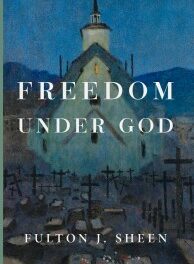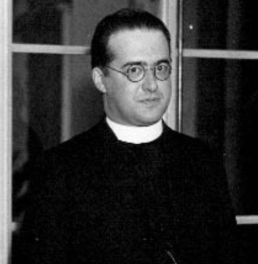We support our Publishers and Content Creators. You can view this story on their website by CLICKING HERE.
We suffer from bifurcation and interior dividedness because our souls are disordered. This is crippling to our souls, but it is also good. Why? It is only when we are deathly ill that we can finally come to see that we are in need of healing.
The eminent political philosopher James V. Schall, S.J. has often remarked that the genius of reading a Plato or Aristotle comes from receiving something new that was not seen before. As Fr. Schall would read these giants of the Western tradition, he was often dazzled by pulling out an insight from a passage that he had read hundreds of times, but did not see until that moment. More often than not, such illumination is a key that unlocks meaning to a text wherein the whole can be looked upon with the right lens.
At present, much of our public commentary is centered around the dialectic of “liberalism vs. illiberalism.” While there is certainly much to be gained from this dialectical consideration, I want to provide more of a nuanced reading regarding the problems of the current liberal order. A number of the principles that ground liberalism are, interestingly enough, the very same principles that Plato describes in Book II of the Republic.
This initial recollection came to mind after recently re-reading Plato’s discussion of the two types of cities in Book II of the Republic. In his explication of the first city, we come to an understanding of what a good city might look like. It is one that is natural to human beings, for they are not self-sufficient, but in need of one another. Not only is communal life a natural feature of the human condition, there is also the concomitant recognition that there should be an equitable division of labor. “One man, one job” means that we are not capable of producing the necessary goods for human life all on our own. Additionally, Plato’s first city is grounded in nature, since the needs and wants of its citizens are limited by what genuinely fulfills well-ordered desires. This first city is coined by Plato as the “true city.”
The “true city” is contrasted with the “luxurious,” or “feverish city.” While much can be said about it, the feverish city’s penultimate principle is “the unlimited acquisition of money.” In the first city, currency of some sort would certainly exist (“a token of exchange”). However, currency is a means of exchange, and good only to the degree that it is supportive of, and rooted in, what is the highest Good of human life.
What happens in the feverish city, in Plato’s reckoning, is critically important, especially with regard to the remaining books of the Republic. In contrast to the “true city,” the feverish city conceives of desire as something that can no longer be “pushed down” by nature and limits.
Thus, desire becomes unbounded, unshackled from the chains of order. It is for this reason that the feverish city’s first principle spills over into the arena of geographic and military empire. With the release of desire comes its eventual demise, for all is wanted, but nothing satiates.
The textual narrative I have briefly summarized leads to an initial judgment that the feverish city is grossly disordered. We can so readily connect the feverish city to the decline of oligarchy into democracy in Book VIII of the Republic. The feverish city, to echo Plato’s language, is a city of appearances. How easy it becomes to envision our own liberal democratic selves in this city.
It is precisely at this moment that Plato unsettles even his most devoted students, those would-be philosophers who want to hear justice praised for itself, and not for its appearances. After describing the first city, Glaucon charges Socrates with having described a “city of pigs,” one where “these men have feast without their relishes.” So Socrates will go on and provoke us:
I understand. We are, as it seems, considering not only how a city, but also a luxurious city, comes into being. Perhaps that’s not bad either. For in considering such a city too, we could probably see in what way justice and injustice naturally grows in cities (emphasis mine).
Why is such a passage unnerving for readers? Consider that for Plato, the frequent use of medical language is a central backdrop for his method of dialectic. The first city is aptly characterized as healthy, precisely because it is ordered in accord with nature and what is. The feverish city is out of order, and thus sick. Yet, in the just-cited passage, we are asked to ponder: If the feverish city is sick, then how can it recover its health? The simple answer, sticking with the medical linguistic, is doctors. However, the true city is not diseased, but is already healthy, and therefore does not need a doctor. The healing medicine for a sick city is the presence of philosophy, which does not seem to be present in the healthy city (at least with respect to Plato’s argument).
A mysterious puzzle is thus being put in front of our eyes. The feverish city is one drawn to appearances because its disordered desires have pulled it away from what is real, and thus truly good. At first glance, we may be inclined to think that in order to ascend to the Good, we must circumvent, or go around, the appearances. Plato, in fact, is saying just the opposite: In order to see the Good, we will have to go through and encounter the appearances directly. Only in this way can we “probably see in what way justice and injustice naturally grows in cities.”
The city, though, is an analogue for the soul. Perhaps we could align Plato with a modern philosopher-physician, Walker Percy. The novelist Percy is known for telling us that we are suffering from the sickness of an existential malaise. We suffer from bifurcation and interior dividedness because our souls are disordered. This is crippling to our souls, but it is also good.
Why? It is only when we are deathly ill that we can finally come to see that we are in need of healing.
In the opening of Book III of the Confessions, Augustine laments how unhealthy his soul was when he came to Carthage. The more he pursued the “slime of lust,” the emptier he became. But the depth of Augustine’s sickness is something God is preparing for his rise and transformation.
Our human condition is characterized by a sickness, and it is only in experiencing this in the depth of our own souls can we come, like Augustine, to profess
…and with an incredible warmth of heart, I yearned for an immortality of wisdom and began now to arise that I might return to thee.
Let me briefly recall a principle of liberalism that I alluded to in the beginning of this essay, especially as it aligns with Plato’s vision in the Republic. The relationship between the predominance of wealth, the unleashing of the passions, and “democratic man,” is observed by the nineteenth-century social theorist, Alexis de Tocqueville. In Democracy in America, Tocqueville writes,
Men who live in democratic societies have many passions; but most of their passions end in love of wealth or issue from it. That comes from the fact not that their souls are smaller, but that the importance of money really is greater then…
Tocqueville is calling to mind the fundamental difference between aristocratic and democratic man: The former conceives of a variety of economies, whereas the latter can only see the singular economy of wealth. The equality of social conditions has meant the gradual replacement of the stability and the once-existing associational forms of life that characterized the aristocratic age. He goes on to further emphasize his contention:
…the prestige that attached to old things having disappeared, birth, condition, and profession no longer distinguish men or hardly distinguish them; there remains scarcely anything but money that creates very visible differences between them… Distinction that arises from wealth is increased by the disappearance and diminution of all the others.
However we may attempt to define or characterize liberal thought, Tocqueville’s conclusion that wealth becomes one of the predominant principles of democratic societies should not be neglected. It could certainly be argued that Plato’s feverish city corresponds to liberalism, where the passions are released from their limits, and wealth comes to take over the reins. Such a judgment is certainly one that is deeply troubling. And yet, a deeper nuance and judgment is also at play here. As Plato judged, it is only through the feverish city, found in our souls, where appetite and wealth seek to rule our souls, that we can eventually ascend and yearn for “an immortality of wisdom.”
The cure comes when we admit that we are ill, and thus in need of a physician. This truth will always be the case, no matter what regime we live in, not least of all in our own liberal democratic times.
This essay was first published here in July 2018.
The Imaginative Conservative applies the principle of appreciation to the discussion of culture and politics—we approach dialogue with magnanimity rather than with mere civility. Will you help us remain a refreshing oasis in the increasingly contentious arena of modern discourse? Please consider donating now.
The featured image is “Women of Amphissa” (1887), by Lawrence Alma-Tadema, and is in the public domain, courtesy of Wikimedia Commons.

 Conservative
Conservative  Search
Search Trending
Trending Current News
Current News 






